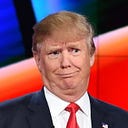Day 1,059: Trump’s trade deal is as phony as a three-dollar bill
China has steamrolled Trump over a year-and-a-half of negotiations.
For more than 18 months, Donald Trump has engaged in a fruitless trade war with China. The result has been a disaster for many sectors of U.S. commerce. Farmers have received billions of dollars in federal bailouts financed by American taxpayers; manufacturing dove to the lowest in a decade; China has stopped importing nearly as many goods, turning their priorities elsewhere and creating supply chains that could last decades; and Americans paid far more for imported goods than they used to thanks to tariffs being passed down from manufacturer and retailer to end-consumer.
Desperate for a deal, Trump claimed victory on Friday over negotiations with China.
Except, the deal — and it’s only a small portion of the overall negotiation — isn’t much of one at all. It was a total capitulation to the Chinese.
President Trump’s initial retreat from his trade-war threats has handed hard-liners in China a victory. A longer, pricklier trade war and stiff Chinese resistance to economic reforms could result.
Mr. Trump on Friday outlined a partial trade deal that deferred new tariffs on $160 billion a year in Chinese-made goods, a move that would have had him taxing virtually everything China sells to the United States. He also agreed for the first time to broadly reduce tariffs he had already imposed on Chinese goods, halving tariffs on more than $100 billion a year worth of products like clothing and lawn mowers — a striking about-face for a protectionist president who last year described himself as a “tariff man.”
But the deal may be seen by Xi Jinping, China’s top leader, and his hard-line supporters as vindication of the intransigent stance they have taken since the spring, when a previous pact struck by Chinese moderates fell apart. Since then, China has asked that even a partial deal include tariff rollbacks. American officials resisted, debated, then relented.
In essence, a year and a half into the trade war, China seems to have hit on a winning strategy: Stay tough and let the Trump administration negotiate with itself.
“The nationalists, the people urging President Xi Jinping to dig in his heels and not concede much, have carried the day,” said George Magnus, a research associate at Oxford University’s China Center. “I don’t see this as a win for market liberals.”
If anything, Beijing is likely to grow even bolder moving forward after seeing how easily Trump has been played.
Friday’s announcement makes it likelier that China will resist any further concessions next year, and perhaps beyond. It seems to affirm the belief, held by many Chinese officials, that Mr. Trump will back off from his trade-war threats if markets tumble, or if his supporters in agricultural states suffer too much.
Even before Friday, Mr. Trump had delayed or canceled tariffs four times this year. Such policy shifts could ultimately encourage Beijing to draw out negotiations even further, to reach the best possible deal.
Farmers and analysts weren’t buying that Trump’s words of a trade victory carried much weight either, especially as China hasn’t confirmed any of his biggest talking points.
“China has yet to confirm this pledge or provide any details on how they will meet it,” said Brian Kuehl co-executive director of Farmers for Free Trade, which backs removing tariffs and opening markets. “There are rightfully many doubts about the president’s claim that China will purchase $50 billion in ag products in a single year — more than twice the level of pre-trade war annual purchases.”
At Friday’s briefing, Ning Jizhe, a top deputy of the National Development and Reform Commission, hewed to the position Beijing has maintained throughout the negotiations: “Expanding trade cooperation must be based on market principles and WTO rules.”
That emphasis raised questions about whether China committed to any big purchases of U.S. products at all, according to industry experts tracking the talks. In addition, they said, the fact that the U.S. only agreed to modest tariff reliefs as part of the phase-one deal also shows that the purchases Beijing agreed could be less than originally sought by Mr. Trump.
The trade war has been a huge, self-inflicted mistake for the U.S. Phase one of the deal doesn’t solve any real problems, other than some of the ones Trump created for himself. And the damage has already been done, both with the $28 billion given to farmers in bailout cash, but also with jobs that have been lost. American consumers have needlessly paid more for the same goods.
Trump has never understood the mechanisms of a trade war and tariffs. That has been abundantly clear as he has floundered through over 18 months of negotiations with China that has ended up netting the U.S. nothing.
1,059 days in, 403 to go
Follow us on Twitter at @TrumpTimer
